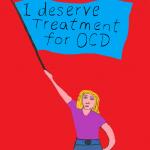10 Useful Links For University Students With OCD
Are you starting your first year at university this September? Or are you going back for your second or third year at university or college? If you’re affected by obsessive compulsive disorder (OCD) – or you think that you might be – then it’s good to know about some of the services, websites, helplines and resources that you can access.
Here are ten of the links that you might find useful while you’re at university:
- The OCD Action telephone helpline. (Tel 0845-390-6232.) Open from 9am to 5pm, Mondays to Fridays.
- The Nightline Association telephone helplines. (Helplines for university students.)
- The OCD Action email support service. (Send emails to: support@ocdaction.org.uk)
- The NHS Choices website. (You can find information here about lots of different physical and mental health conditions. And you can also use the NHS Choices website to locate the free NHS / IAPT mental health services in your local area anywhere in England.)
- The main OCD Action website (ocdaction.org.uk) and the OCD at School website (ocdyouth.org).
- The NICE Guidelines for Treating OCD or BDD. (Guidance produced by the National Institute for Health and Clinical Excellence.)
- The OCD and BDD GP Card. (Information produced by OCD Action to help you when you’re talking to your GP about your OCD.)
- The free OCD Advocacy Service run by OCD Action. (You can call or email our OCD Advocacy Manager, Collette Byrne, on tel 0207-253-5272 or email: collette@ocdaction.org.uk)
- The OCD Action Youth Twitter page. (Created and run by young people (aged 25 and under) who care about OCD and mental health.)
- OCD Support Groups. (There are lots of OCD support groups all around the UK. If you’d like some help finding your local OCD support group, or you think you might be interested in helping to set up a new OCD support group in your local area, you can contact Keira Bartlett at OCD Action on tel 01263-510-705, or by emailing keira@ocdaction.org.uk)
In addition to all of the above resources and services, you can speak to your university’s disability service; you can speak to your university’s counselling team; and you can speak to your student union to find out about other services that might be available to you. And of course, always speak to your GP if you feel able to.
The biggest thing to remember is that you are not alone. 1 to 2% of the population is estimated to be affected by obsessive compulsive disorder (OCD). If you don’t know how to explain your experiences to your GP, or how to tell your friends or your tutors about what you’re going through, a first step might be to call the OCD Action telephone helpline – or use any of the services listed above.
Take a look at Megan’s experience of university here.






